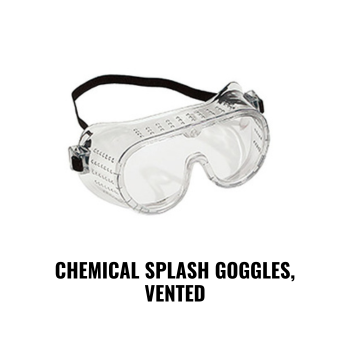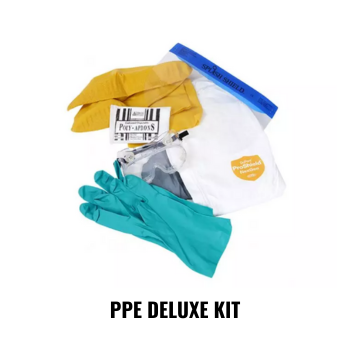We use cookies to make your experience better. To comply with the new e-Privacy directive, we need to ask for your consent to set the cookies. Learn more.
Battery PPE for Changing, Charging, Washing, and Watering
Personal protective equipment (PPE) is essential in the battery room. That’s not just our opinion: OSHA 1926.441(a)(5) specifically states that “face shields, aprons, and rubber gloves shall be provided for workers handling acids or batteries.”

Note the language “shall be provided,” which explicitly indicates that employers must purchase PPE for their workers. Additional OSHA standards related to battery PPE include OSHA 1910.133(a)(1) and 1910.132. The National Fire Protection Association’s 505 9.3.7.3 offers additional (but similar) requirements.
Of course, most of these standards simply require appropriate “protection" and don’t provide much additional detail. Therefore, employers must ensure that every piece of battery PPE is appropriate for the task at hand. In this article, we’ll attempt to make that process easier by addressing some of the common questions regarding battery room safety.
Which Workers Require PPE in the Battery Room?
In short, anyone who has any risk of coming into contact with battery electrolyte should wear PPE. Yes, that means everyone, regardless of the risk of exposure; even when employees are performing basic maintenance (for instance, battery washing), they need to take precautions to prevent a minor spill from becoming a major incident.
Workers should wear PPE when engaging in any battery room task, including (but not limited to):
- Watering batteries
- Mixing electrolyte
- Washing battery cases
- Charging or changing out batteries, if the worker directly handles the battery
Accidents can happen at any time, so if workers spend significant time in the battery room, they should wear PPE — even if their duties don’t require direct interaction with batteries. Just as importantly, the equipment needs to be properly fitted to the employee. Managers should establish strict protocols to ensure that all employees wear their PPE when handling batteries.
To ensure compliance with safety regulations, make sure that workers understand the importance of personal protective equipment. PPE should be inspected and sanitized regularly and discarded if it shows signs of wear. All personnel should know where PPE is located; storing your PPE in a cool, dry place (such as a PPE Storage Cart) can limit wear and prevent premature replacement.
Basic Battery PPE: What to Look For When Buying
The National Institute for Occupational Health and Safety (NIOSH) publishes recommendations for chemical protective clothing. These recommendations can provide peace of mind for employers who want to establish safer operations.

In a standard industrial battery room, employers should choose battery PPE that is specifically designed to resist acids and alkali. Rubber and nitrile provides sufficient protection by preventing skin exposure, so look for equipment that uses these materials. OSHA requires several categories of PPE, and to train workers appropriately, employers should understand the purpose of each type:
- Goggles - Goggles cover the eye sockets completely, protecting the worker’s vision from chemical exposure. Safety glasses serve a similar function, but do not create a seal on the face.
- Recommendation: Safety goggles include venting, which prevents the goggles from fogging up during normal use. This can help to ensure that workers wear their PPE as intended. Solus Group also offers safety glasses with side shields, which may be more comfortable for some workers.
- Face Shields - Face shields are intended to shield the entire face from battery acid and other chemicals. They are intended as secondary protection for the face — that means that face shield should be worn in addition to goggles.
- Recommendation: A Splash Shield is an affordable, disposable face shield that provides additional protection from chemicals in the battery room.

- Recommendation: A Splash Shield is an affordable, disposable face shield that provides additional protection from chemicals in the battery room.
- Gloves and Boots - Gloves protect the worker’s hands, which have a relatively high chance of exposure to battery chemicals during routine maintenance (such as watering or charging). Overboots are intended to help a worker maintain traction while cleaning up spills. Latex overboots can also limit exposure to chemicals.
- Recommendation: When battery room PPE is designed to prevent skin contact, look for rubber or nitrile materials. Nitrile Chemical Gloves provide excellent protection for battery room workers. Latex Boots provide slip protection during clean-up.
- Chemical Aprons - Chemical aprons protect the clothing and skin, though all workers should wear loose-fitting, long-sleeved shirts at all times when working with batteries. While aprons can protect against splashes, workers should still remove exposed clothing and follow appropriate safety protocols.
- Recommendation: Chemical/Acid Apron can be worn comfortably to limit exposure resulting from spills or sprays.

- PPE Kits for the Battery Room - To ensure that workers have access to high-quality PPE, consider purchasing complete kits. The PPE Deluxe Kit includes a disposable face shield, safety glasses, nitrile gloves, a chemical coverall, a disposable apron, and latex overboots.
Remember, purchasing PPE is a single component of your operation’s safety strategy. Wherever possible, employers should attempt to create a safer workspace by purchasing high-quality material handling equipment and designing facilities to eliminate unnecessary hazards. PPE is the last entry in OSHA’s hierarchy of controls, so use PPE as a last resort to limit exposure — not as a primary control.
Employees should also receive regular training to ensure that all personnel take appropriate actions when handling or maintaining batteries. Proper training also ensures an appropriate emergency response. For more quick tips, check out our article “Battery Room Safety Tips for Beginners.”
To find battery PPE for your operation, browse the product pages listed above or call the Solus Group sales team at 314-696-0200 to discuss your facility’s unique needs. You can also contact our team by clicking here.
